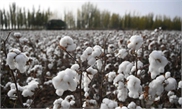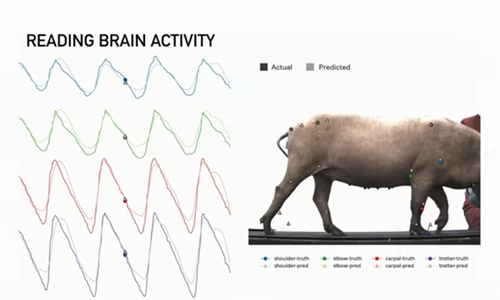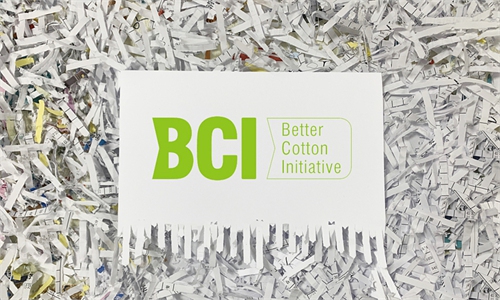Exclusive: Stories behind BCI ceasing sourcing cotton from China’s Xinjiang over forced labor rumors
The Global Times has learned that the Better Cotton Initiative (BCI), a non-governmental organization that aims to promote better standards in cotton farming, has suspended licenses to companies in Northwest China's Xinjiang Uygur Autonomous Region, a move that may deal a blow to related industries in the region.
BCI's decision has been made right when the anti-China forces in the US and some Western countries are making concerted efforts to slander China's policies in its Xinjiang region. Are there any links between BCI's decision and anti-China forces' efforts? What is the reality for Xinjiang's cotton-related industries?
At the end of 2020, the Global Times reporters went to many companies in the textile and cotton-related industries in the Bayingolin Mongolian Autonomous Prefecture and the Aksu Prefecture and found that the so-called forced labor allegation is a presumption of guilt made by the anti-China forces overseas to smear the region. The Global Times reporters also learned that to cooperate with anti-China forces, the headquarters of the BCI overruled, for no reason at all, the conclusion made by BCI's office in Shanghai of "there is no forced labor in Xinjiang" after several field reviews.
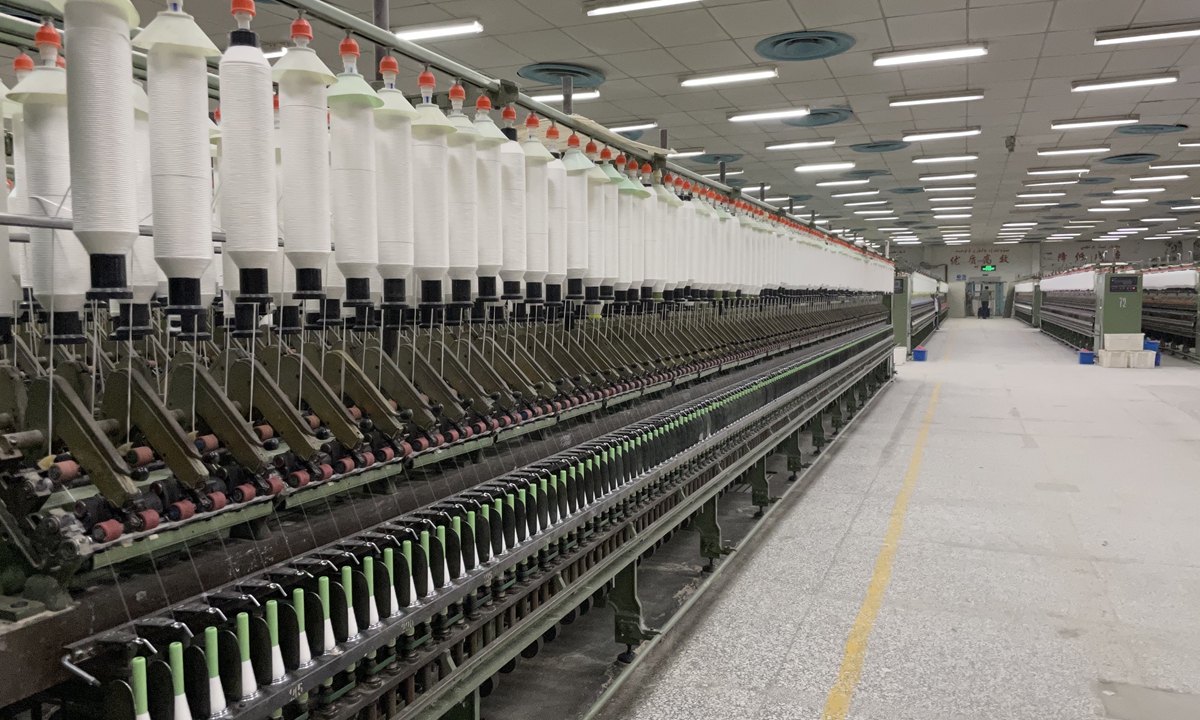
Hitting the pause button
On March 12, 2020, Zhang Biao, chief manager of a company named Zhongwang in Yuli county of the Bayingolin Mongolian Autonomous Prefecture received an email from the BCI.
It said that given the "current complicated international environment", the BCI decided to suspend giving licenses or certificates from 2020 to 2021 in China's Xinjiang region. The organization will update its standards during the suspension period to better deal with the environment.
This email and its contents confused Zhang as his company has been one of the companies with which BCI's cooperated in Xinjiang for years and the reasons for suspending the licenses for "updating the standards" sounded disingenuous.
In responding to the Global Times's questions on further explaining the reasons and what was meant by "complicated international environment," BCI's Shanghai office did not give a clear answer and it said the email was penned by the headquarters office in English, and the Shanghai branch translated it into Chinese and sent it to companies in Xinjiang.
As an international NGO, which was registered in Geneva of Switzerland with its head offices in Geneva and London, BCI's licenses have significant meaning to Chinese companies. According to an introduction from its website, BCI is the largest cotton sustainability program in the world. At the end of 2019, BCI had more than 1,840 members, spanning the entire global cotton supply chain from farmer organizations through to retailers and brands. In 2019, BCI Retailer and Brand Members sourced more than 1.5 million metric tons of Better Cotton, including brands such as H&M, Adidas, and Nike.
"The value of BCI's certificate depends on who are your target customers. If your customers are all BCI retailers and brand members, then its certificate and licenses are very important because with no certificate, you cannot sell your products to these companies," Zhang told the Global Times.
Zhang's company joined BCI's program in 2015. "A yarn company in Jiangsu Province is the supplier for IKEA. According to IKEA's standard, only materials that meet BCI's standards can be used for its suppliers. We are helping the Jiangsu company to plant, collect and produce cotton under the BCI standards."
The sudden suspension of cooperation from the BCI has caught many companies in Xinjiang which have joined in its programs off guard and caused losses. A company named Haoxing, which runs cotton-buying businesses in Xinjiang, has cooperated with BCI for a long time.
Gao Ruinan, a manager of Haoxing, told the Global Times that BCI's suspending cooperation has caused losses amounting to 14 million yuan (2.14 million) for the company. "The major blow is on the sales channels. Many companies in other places in China have recognized the BCI standards in recent years and the suspension has put great pressure on the company's sales."
However, not all companies suffered great losses. Liu Wenxin, a manager from Zhongliang company in Yuli county, told the Global Times that "suspending the licenses may be a great shock to us many years ago as many of the yarn companies we are doing business are using cotton under BCI standards. But after 2018, we have expanded the futures contracts, which have limited the impact."
Echoing Liu, Zhang said that for cotton-producing companies, the influence of BCI's suspending licenses in Xinjiang is "under control" as the greater impact was on the downstream portion of the industry chain - the yarn companies.
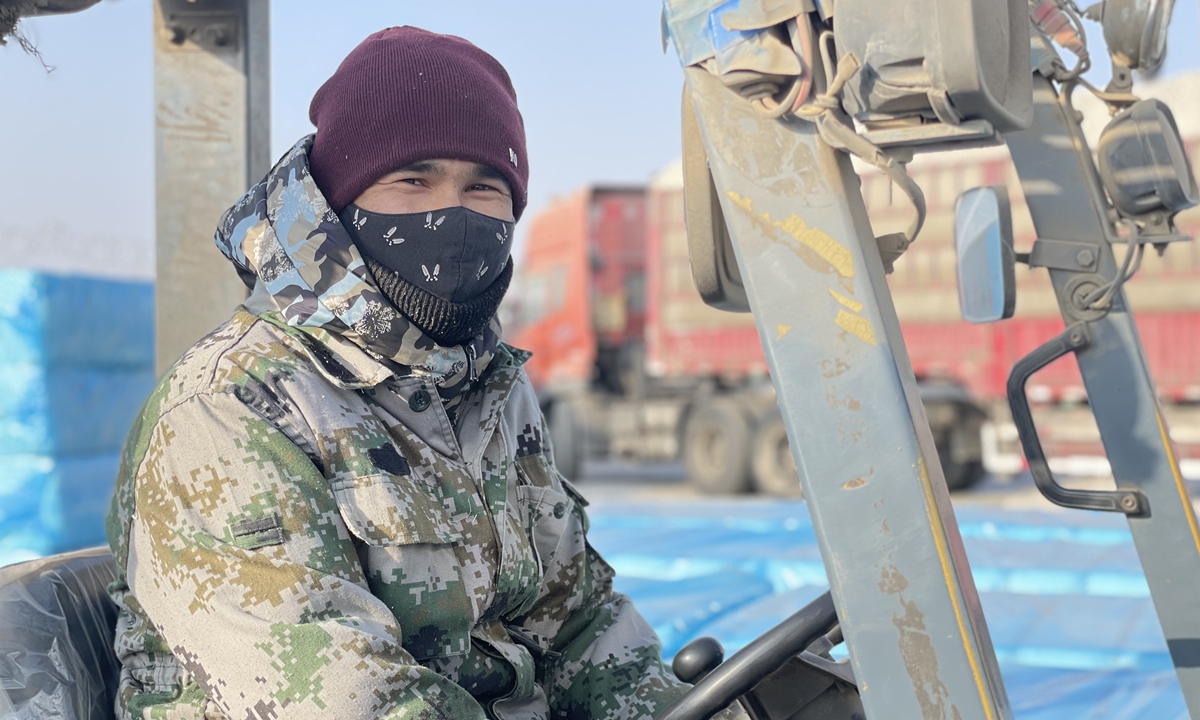
Reasons that cannot tell
Aside from the loss by companies in Xinjiang, BCI's suspension decision also hurt the image of Xinjiang's cotton.
BCI's principles stress minimizing the harmful impact of crop protection practices, promote water stewardship, care for the health of the soil, enhance the biodiversity and use of land, care for and preserve fiber quality and promote decent work.
Many companies in Xinjiang firstly joined the BCI programs aimed to enhance their planting and collecting of cotton.
Li Chengjun, head of the Taichang Agricultural Company, still remembered their signing of the agreements with BCI in 2013. "We are large farms and wanted to learn advanced agricultural technologies, for example on how to reduce cost while increasing yields. When they talked about 'decent work' at that time, I was confused by the phrase. Finally, I figured it out - the rules are nothing new from what we already have in our Labor Law."
Li thought the BCI's principles were good and some terms it used were different from what they had already used and practiced.
"After signing the agreement, BCI conducts a review every two years and we are also asked to conduct a self-assessment. No problem has been found in these past years," Li told the Global Times.
Many other companies reached by the Global Times also confirmed that their cooperation with the BCI had been smooth until the arrival of the email on suspensions. Requests for further explanations have not been answered.
All these seemed to suggest "updating standards" is circumlocution with BCI which still has unrevealed reasons while anti-China forces are hyping them as "forced labor."
For example, the infamous BBC cited anti-China "scholar" Adrian Zenz in a report aired in December 2020, saying that "new evidence suggests that upwards of half a million minority workers a year are also being marshaled into seasonal cotton-picking under conditions that again appear to raise a high risk of coercion."
On December 12, 2020, the US Department of Homeland Security also announced that US Customs and Border Protection (CBP) personnel at all US ports of entry would detain shipments containing cotton and cotton products originating from the Xinjiang Production and Construction Corps (XPCC) based on "information that reasonably indicates the use of forced labor."
Seeing is believing
The anti-China forces in the US and Western countries have made moves and to cooperate with them, the reports on Xinjiang's cotton related industries in the Western media have already preset similar scenarios - a bunch of workers from ethnic minorities being forced to pick cotton in the fields or working in dirty plants; they have meager wages and may suffer punishments for small errors… this were the images that BBC and some Western media tried to portray.
What is the truth? The Global Times has learned that cotton-related industries cover agriculture, the processing industry, and even the service industry - which are complicated but with clear development patterns. The only procedure that may involve a large number of laborers is collecting cotton.
One big mistake made by the BBC in its December report is to say half of a million people were being "forced" to pick cotton by hand while in fact machines have been largely used in Xinjiang.
Industry insiders in Xinjiang told the Global Times that it is impossible to finish collecting cotton in Xinjiang within December if few machines are being used. But the companies the Global Times have visited in December had finished the collecting and finalized the initial processing of the cotton.
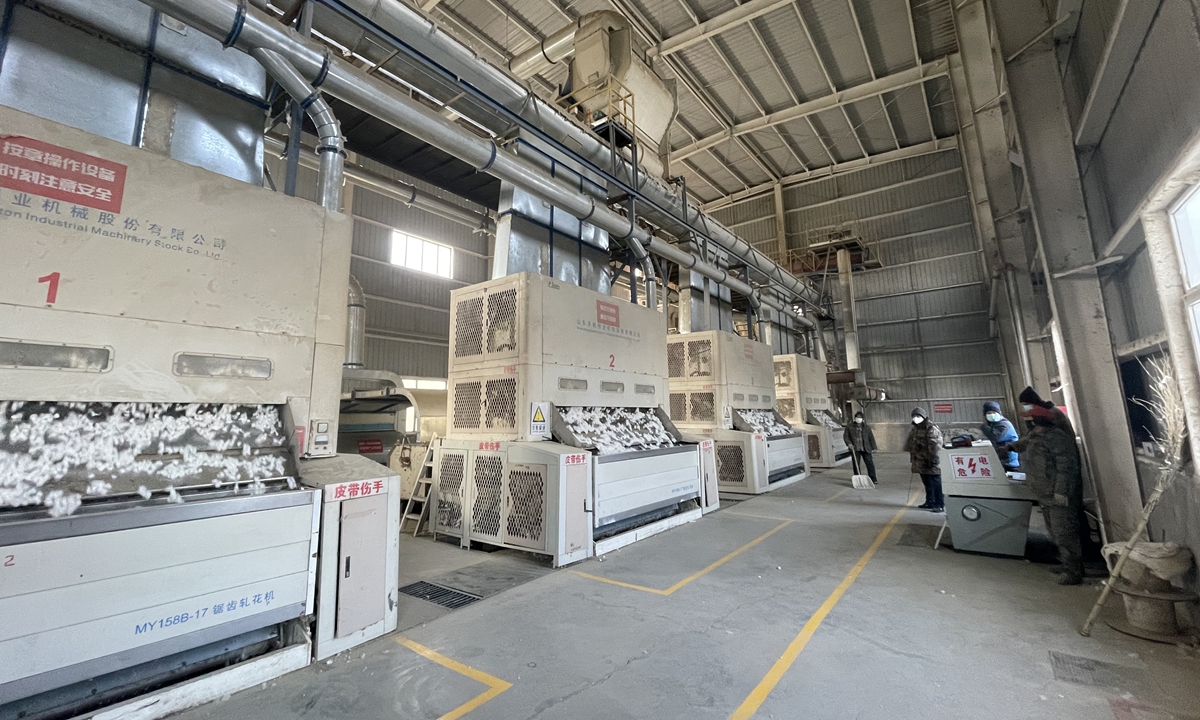
Mutalip Zeyap, a 35-year-old resident in Luntai county, would come to work at the Guoxin company from September to December every year since 2017 and his colleagues liked to call him "A Mu."
A Mu is responsible for security in the plant - he needs to check the machines when cotton is fed in to be deseeded.
"My work is quite easy as machines are doing most of the work. I only need to make sure the machines operate well," A Mu said while cleaning cotton fibers from the machines.
A Mu said that he learned how to fix these machines after coming to work at the company. "At first, I made many mistakes but my team leader never admonished me for that, instead, every time he asked me whether I was injured or not. He always said that the machines can be fixed later but I cannot get injured."
In responding to whether ethnic workers in the company are "forced" to work in the company, A Mu seemed angry. "Why did they say we are forced? We come here voluntarily to earn money. We also have the right to live a better life through our work!"
Lu Chunjian, a legal representative of the company, told the Global Times that there were long lines when the company recruits workers in spring. "Some villagers rent a car to drive them to apply for the jobs. Some villagers who fail to be employed even cry. They want to work here. Those we employed in 2015 have earned the money to buy new cars this year."
Aside from the cotton processing companies, how about the working environment in downstream companies?
Take the Taichang Yarn Company in the Korla as an example. A few workers have been found in the large plant with more than a dozen spinning machines working together.
The ethnic minorities account for 95 percent of the total number of its workers at Taichang Yarn Company. It offered free accommodations for all workers and child care.
The Global Times reporters saw the payrolls of workers after getting permission from workers and found that most of them can earn more than 4,000 yuan a month. An employee named Rushangul also had her first contract sighed in 1990 with the company. The copy of the contract has been and will be kept in the company forever as "every employee is respected here," a member of the managing staff told the Global Times.
Li Chengjun from Taichang told the Global Times that he used to communicate with BCI staff about where the "indecent work" called by the BCI is practiced. "They said that for example, India. Some owners of the farms asked workers to serve them as a lord, for example, help the owner to wipe their face with towels."
"This thing would not happen here - we wouldn't dare to make employees wipe our faces; we would like to wipe our employees' faces to please them so they can work here longer," Li laughed.
"I told the BCI staff that their principles of 'decent work' are an unnecessary move in China as we have the overall regulations and laws to protect workers' rights and interests. And considering the current situation in the labor market, companies are working so hard to recruit and maintain capable employees," Li said.
Arbitrarily Overturning
It is obvious that "forced labor" accusations are ignorant and malicious presumptions of culpability without verifiable facts. All the companies the Global Times has reached which had been in cooperation with BCI, have confirmed that no such thing as "forced labor" has been found in BCI's previous reviews in Xinjiang. But why did the NGO suspend offering certificates in China's Xinjiang region?
The Global Times has learned that soon after anti-China forces started to hype "forced labor" topics, cotton-related companies in Xinjiang have conducted self-assessments and surveys.
The BCI Shanghai office told the Global Times that the BCI's review includes self-assessments, reviews from partners, and reviews from the BCI and third-party review organizations. Only those who passed all these reviews can get the certificate from BCI. "For the past eight years, all partners of BCI in Xinjiang have passed all reviews under the standards of Better Cotton and no forced labor or coercive labor that violated the Better Cotton principles have been found."
However, the head office of the BCI overruled the investigation and conclusion of the Shanghai office and member companies' self-assessments and instead continued to carry on the surveys and rectification.
When pushing for the investigation, the head office also cited a large amount of disinformation spread by anti-China organizations, including the US-based World Uyghur Congress and the Human Rights Watch, making the so-called investigation untenable on credibility and authenticity.
On October 21, 2020, BCI announced on its website to cease all field-level activities in China's Xinjiang region.
"By suspending its activities in China's Xinjiang, BCI lost 90 percent of its business in China. It is cutting its own limbs off," an industrial insider told the Global Times.
BCI's move was driven by pressure from outside as well as other interests. The Global Times has learned that many BCI council members are representatives from BCI brand members from the US and various European countries. Since member fees are the main financial source for BCI, brand members including Nike, LEVIS, or GAP from the US have significant influence. The US Agency for International Development was once a council member.
The industrial insider told the Global Times that employees of BCI's Shanghai office have been under great pressure since 2019. "The US may want to kill two birds with one stone - by pressuring BCI, it could slander China's Xinjiang and also squeeze BCI's market to promote its own standards on cotton industries."
In responding on whether the current situation would ease, the insider said that "it depends on the international political situation."
BCI's decision has been made right when the anti-China forces in the US and some Western countries are making concerted efforts to slander China's policies in its Xinjiang region. Are there any links between BCI's decision and anti-China forces' efforts? What is the reality for Xinjiang's cotton-related industries?
At the end of 2020, the Global Times reporters went to many companies in the textile and cotton-related industries in the Bayingolin Mongolian Autonomous Prefecture and the Aksu Prefecture and found that the so-called forced labor allegation is a presumption of guilt made by the anti-China forces overseas to smear the region. The Global Times reporters also learned that to cooperate with anti-China forces, the headquarters of the BCI overruled, for no reason at all, the conclusion made by BCI's office in Shanghai of "there is no forced labor in Xinjiang" after several field reviews.

The cotton gins in a coat factory in Northwest China's Xinjiang Uygur Autonomous Region
Hitting the pause button
On March 12, 2020, Zhang Biao, chief manager of a company named Zhongwang in Yuli county of the Bayingolin Mongolian Autonomous Prefecture received an email from the BCI.
It said that given the "current complicated international environment", the BCI decided to suspend giving licenses or certificates from 2020 to 2021 in China's Xinjiang region. The organization will update its standards during the suspension period to better deal with the environment.
This email and its contents confused Zhang as his company has been one of the companies with which BCI's cooperated in Xinjiang for years and the reasons for suspending the licenses for "updating the standards" sounded disingenuous.
In responding to the Global Times's questions on further explaining the reasons and what was meant by "complicated international environment," BCI's Shanghai office did not give a clear answer and it said the email was penned by the headquarters office in English, and the Shanghai branch translated it into Chinese and sent it to companies in Xinjiang.
As an international NGO, which was registered in Geneva of Switzerland with its head offices in Geneva and London, BCI's licenses have significant meaning to Chinese companies. According to an introduction from its website, BCI is the largest cotton sustainability program in the world. At the end of 2019, BCI had more than 1,840 members, spanning the entire global cotton supply chain from farmer organizations through to retailers and brands. In 2019, BCI Retailer and Brand Members sourced more than 1.5 million metric tons of Better Cotton, including brands such as H&M, Adidas, and Nike.
"The value of BCI's certificate depends on who are your target customers. If your customers are all BCI retailers and brand members, then its certificate and licenses are very important because with no certificate, you cannot sell your products to these companies," Zhang told the Global Times.
Zhang's company joined BCI's program in 2015. "A yarn company in Jiangsu Province is the supplier for IKEA. According to IKEA's standard, only materials that meet BCI's standards can be used for its suppliers. We are helping the Jiangsu company to plant, collect and produce cotton under the BCI standards."
The sudden suspension of cooperation from the BCI has caught many companies in Xinjiang which have joined in its programs off guard and caused losses. A company named Haoxing, which runs cotton-buying businesses in Xinjiang, has cooperated with BCI for a long time.
Gao Ruinan, a manager of Haoxing, told the Global Times that BCI's suspending cooperation has caused losses amounting to 14 million yuan (2.14 million) for the company. "The major blow is on the sales channels. Many companies in other places in China have recognized the BCI standards in recent years and the suspension has put great pressure on the company's sales."
However, not all companies suffered great losses. Liu Wenxin, a manager from Zhongliang company in Yuli county, told the Global Times that "suspending the licenses may be a great shock to us many years ago as many of the yarn companies we are doing business are using cotton under BCI standards. But after 2018, we have expanded the futures contracts, which have limited the impact."
Echoing Liu, Zhang said that for cotton-producing companies, the influence of BCI's suspending licenses in Xinjiang is "under control" as the greater impact was on the downstream portion of the industry chain - the yarn companies.

A local man drives a forklift truck in a trading company at Yuli county, Northwest China's Xinjiang Uygur Autonomous Region.
Reasons that cannot tell
Aside from the loss by companies in Xinjiang, BCI's suspension decision also hurt the image of Xinjiang's cotton.
BCI's principles stress minimizing the harmful impact of crop protection practices, promote water stewardship, care for the health of the soil, enhance the biodiversity and use of land, care for and preserve fiber quality and promote decent work.
Many companies in Xinjiang firstly joined the BCI programs aimed to enhance their planting and collecting of cotton.
Li Chengjun, head of the Taichang Agricultural Company, still remembered their signing of the agreements with BCI in 2013. "We are large farms and wanted to learn advanced agricultural technologies, for example on how to reduce cost while increasing yields. When they talked about 'decent work' at that time, I was confused by the phrase. Finally, I figured it out - the rules are nothing new from what we already have in our Labor Law."
Li thought the BCI's principles were good and some terms it used were different from what they had already used and practiced.
"After signing the agreement, BCI conducts a review every two years and we are also asked to conduct a self-assessment. No problem has been found in these past years," Li told the Global Times.
Many other companies reached by the Global Times also confirmed that their cooperation with the BCI had been smooth until the arrival of the email on suspensions. Requests for further explanations have not been answered.
All these seemed to suggest "updating standards" is circumlocution with BCI which still has unrevealed reasons while anti-China forces are hyping them as "forced labor."
For example, the infamous BBC cited anti-China "scholar" Adrian Zenz in a report aired in December 2020, saying that "new evidence suggests that upwards of half a million minority workers a year are also being marshaled into seasonal cotton-picking under conditions that again appear to raise a high risk of coercion."
On December 12, 2020, the US Department of Homeland Security also announced that US Customs and Border Protection (CBP) personnel at all US ports of entry would detain shipments containing cotton and cotton products originating from the Xinjiang Production and Construction Corps (XPCC) based on "information that reasonably indicates the use of forced labor."
Seeing is believing
The anti-China forces in the US and Western countries have made moves and to cooperate with them, the reports on Xinjiang's cotton related industries in the Western media have already preset similar scenarios - a bunch of workers from ethnic minorities being forced to pick cotton in the fields or working in dirty plants; they have meager wages and may suffer punishments for small errors… this were the images that BBC and some Western media tried to portray.
What is the truth? The Global Times has learned that cotton-related industries cover agriculture, the processing industry, and even the service industry - which are complicated but with clear development patterns. The only procedure that may involve a large number of laborers is collecting cotton.
One big mistake made by the BBC in its December report is to say half of a million people were being "forced" to pick cotton by hand while in fact machines have been largely used in Xinjiang.
Industry insiders in Xinjiang told the Global Times that it is impossible to finish collecting cotton in Xinjiang within December if few machines are being used. But the companies the Global Times have visited in December had finished the collecting and finalized the initial processing of the cotton.

Cotton textile industry in Xinjiang has realized large-scale mechanized operations, with only a small number of workers in the factory.
Mutalip Zeyap, a 35-year-old resident in Luntai county, would come to work at the Guoxin company from September to December every year since 2017 and his colleagues liked to call him "A Mu."
A Mu is responsible for security in the plant - he needs to check the machines when cotton is fed in to be deseeded.
"My work is quite easy as machines are doing most of the work. I only need to make sure the machines operate well," A Mu said while cleaning cotton fibers from the machines.
A Mu said that he learned how to fix these machines after coming to work at the company. "At first, I made many mistakes but my team leader never admonished me for that, instead, every time he asked me whether I was injured or not. He always said that the machines can be fixed later but I cannot get injured."
In responding to whether ethnic workers in the company are "forced" to work in the company, A Mu seemed angry. "Why did they say we are forced? We come here voluntarily to earn money. We also have the right to live a better life through our work!"
Lu Chunjian, a legal representative of the company, told the Global Times that there were long lines when the company recruits workers in spring. "Some villagers rent a car to drive them to apply for the jobs. Some villagers who fail to be employed even cry. They want to work here. Those we employed in 2015 have earned the money to buy new cars this year."
Aside from the cotton processing companies, how about the working environment in downstream companies?
Take the Taichang Yarn Company in the Korla as an example. A few workers have been found in the large plant with more than a dozen spinning machines working together.
The ethnic minorities account for 95 percent of the total number of its workers at Taichang Yarn Company. It offered free accommodations for all workers and child care.
The Global Times reporters saw the payrolls of workers after getting permission from workers and found that most of them can earn more than 4,000 yuan a month. An employee named Rushangul also had her first contract sighed in 1990 with the company. The copy of the contract has been and will be kept in the company forever as "every employee is respected here," a member of the managing staff told the Global Times.
Li Chengjun from Taichang told the Global Times that he used to communicate with BCI staff about where the "indecent work" called by the BCI is practiced. "They said that for example, India. Some owners of the farms asked workers to serve them as a lord, for example, help the owner to wipe their face with towels."
"This thing would not happen here - we wouldn't dare to make employees wipe our faces; we would like to wipe our employees' faces to please them so they can work here longer," Li laughed.
"I told the BCI staff that their principles of 'decent work' are an unnecessary move in China as we have the overall regulations and laws to protect workers' rights and interests. And considering the current situation in the labor market, companies are working so hard to recruit and maintain capable employees," Li said.
Arbitrarily Overturning
It is obvious that "forced labor" accusations are ignorant and malicious presumptions of culpability without verifiable facts. All the companies the Global Times has reached which had been in cooperation with BCI, have confirmed that no such thing as "forced labor" has been found in BCI's previous reviews in Xinjiang. But why did the NGO suspend offering certificates in China's Xinjiang region?
The Global Times has learned that soon after anti-China forces started to hype "forced labor" topics, cotton-related companies in Xinjiang have conducted self-assessments and surveys.
The BCI Shanghai office told the Global Times that the BCI's review includes self-assessments, reviews from partners, and reviews from the BCI and third-party review organizations. Only those who passed all these reviews can get the certificate from BCI. "For the past eight years, all partners of BCI in Xinjiang have passed all reviews under the standards of Better Cotton and no forced labor or coercive labor that violated the Better Cotton principles have been found."
However, the head office of the BCI overruled the investigation and conclusion of the Shanghai office and member companies' self-assessments and instead continued to carry on the surveys and rectification.
When pushing for the investigation, the head office also cited a large amount of disinformation spread by anti-China organizations, including the US-based World Uyghur Congress and the Human Rights Watch, making the so-called investigation untenable on credibility and authenticity.
On October 21, 2020, BCI announced on its website to cease all field-level activities in China's Xinjiang region.
"By suspending its activities in China's Xinjiang, BCI lost 90 percent of its business in China. It is cutting its own limbs off," an industrial insider told the Global Times.
BCI's move was driven by pressure from outside as well as other interests. The Global Times has learned that many BCI council members are representatives from BCI brand members from the US and various European countries. Since member fees are the main financial source for BCI, brand members including Nike, LEVIS, or GAP from the US have significant influence. The US Agency for International Development was once a council member.
The industrial insider told the Global Times that employees of BCI's Shanghai office have been under great pressure since 2019. "The US may want to kill two birds with one stone - by pressuring BCI, it could slander China's Xinjiang and also squeeze BCI's market to promote its own standards on cotton industries."
In responding on whether the current situation would ease, the insider said that "it depends on the international political situation."

